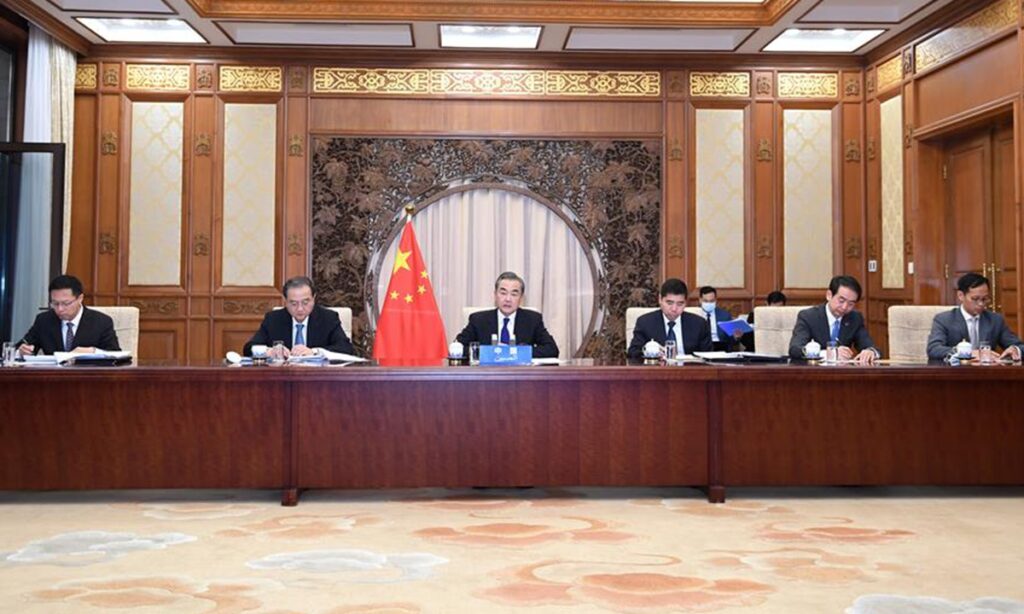Mideast countries seek cooperation with China, to balance US impact: experts
The foreign ministers of Turkey and Iran will visit China on Wednesday and Friday, respectively, the Chinese Foreign Ministry announced on Tuesday amid a first-ever group visit of Gulf Cooperation Council (GCC) countries to China.
During these intensive visits, experts said that major Mideast countries will enhance and accelerate cooperation with China as they are seeking regional stability and development after seeing through the US’ trap, which is to make them rely on the US by creating conflicts in the region.
At the invitation of China’s State Councilor and Foreign Minister Wang Yi, Turkey’s Foreign Minister Mevlut Cavusoglu and Iran’s Foreign Minister Hossein Amir-Abdollahian are scheduled to visit China, Chinese Foreign Ministry spokesperson Wang Wenbin said.
Wang Yi will meet and exchange opinions with both foreign ministers, according to Wang Wenbin.
The intensive visits of Mideast countries are related to the changes in their relationships with the US and their economic plight due to the COVID-19 pandemic, as the regional countries are taking the initiative to reshape the regional structure and seek the most advantageous path for the region, experts noted.
During the presidency of Donald Trump, the US used to play regional countries off against Iran, in order to sell weapons to them and make them rely on the US for protection, Li Weijian, director of West Asian and African Studies at the Shanghai Institute for International Studies, told the Global Times on Tuesday.
This strategy made these Mideast countries waste resources and lose development opportunities, which not only damaged their interests but harmed regional stability, Li said.
The severe impact of the COVID-19 pandemic on the region has made Mideast countries realize that the US’ strategy would not do them good, and their real pursuits at the current time are to get the pandemic under control and revive their economies as soon as possible, while China is the most proper partner to work with in both fields, according to Li.
The Middle East had looked forward to current US President Joe Biden changing the situation, but Biden gave nothing more than lip service, so they started to explore cooperation with major powers like China and Russia and seek regional stability via mutual development, according to experts.
Experts believe that the intensive visits of the Middle Eastern countries’ foreign ministers would be a good start for the region to enhance and accelerate cooperation with China this year.
Wang Yi met Bahraini Foreign Minister Abdullatif bin Rashid Al Zayani in Wuxi, East China’s Jiangsu Province, on Tuesday. China is to assist Bahrain in 5G, e-commerce, the digital economy and big data, and encourage more Chinese firms to invest in Bahrain, Wang Yi said during the meeting.
During a meeting with Saudi Arabian Foreign Minister Faisal bin Farhan Al Saud on Monday in Wuxi, Wang Yi said that the two countries share great potential in trade and investment cooperation.
Saudi Arabia is China’s biggest trade partner and source of crude oil imports in the Middle East. China support the Vision 2030, Green Middle East and Green Saudi Arabia initiatives raised by Saudi Arabia. China wishes to expand bilateral cooperation in new energy, e-commerce, law enforcement security, Chinese language teaching and joint archaeology, Wang Yi said.
Experts expect breakthroughs to be made in the China-GCC Free Trade Agreement during the GCC group visit to China.
China has reached bilateral agreements with many Mideast countries, and now the time is right for an agreement at the regional level to be reached, Li said.
Chinese State Councilor and Foreign Minister Wang Yi attends the ministerial meeting between China and the Cooperation Council for the Arab States of the Gulf (GCC) via video link in Beijing, capital of China, Nov. 9, 2020. Photo: Xinhua


